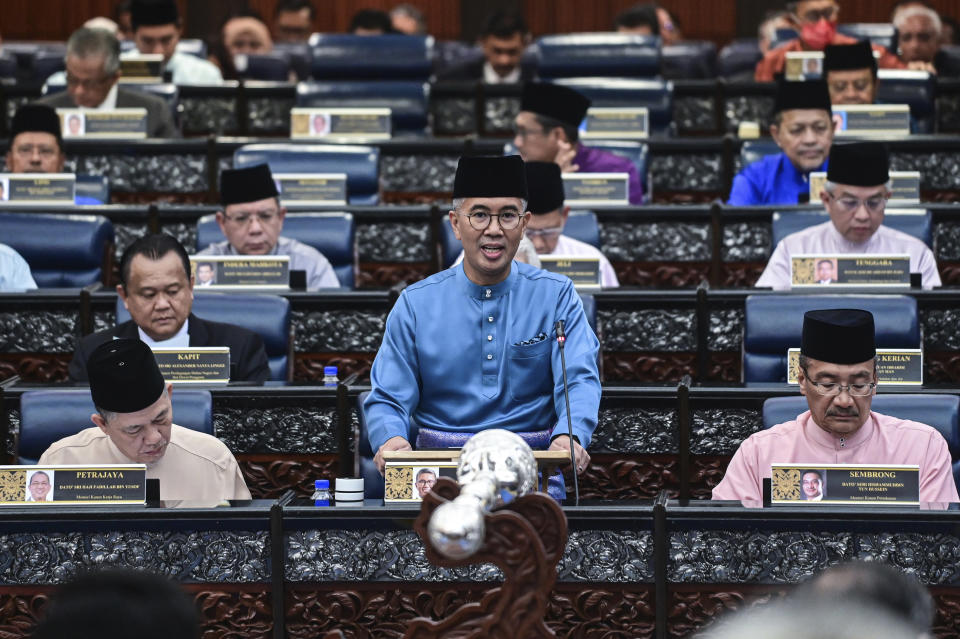Malaysia plans smaller 2023 budget, goodies ahead of polls
KUALA LUMPUR, Malaysia (AP) — Malaysia plans record development spending in 2023 despite a proposed smaller national budget Friday that is also laden with the usual cash handouts, tax cuts and other goodies ahead of impending general elections.
Finance Minister Zafrul Aziz unveiled in Parliament a budget proposal of 372.3 billion ringgit ($80 billion), down from estimated spending of 385.3 billion ringgit ($85 billion) in the current year.
With the economy expected to slow next year amid global uncertainties and an anticipated drop in government revenue, he said the budget aims to balance economic needs with fiscal consolidation. The government’s budget deficit is expected to narrow to 5.5% from 5.8% this year, he said.
The government expects growth to ease to 4%-5% in 2023, from 6.5%-7% forecast this year, as the global economy weakens due to inflationary pressure, geopolitical tensions, tightening financial conditions and supply strains.
Zafrul said a record 95 billion ringgit ($20.4 billion), or a quarter of the budget, are allocated for development spending, 5 billion ringgit for a COVID-19 fund and the rest are for operating expenditures.
With many people hit by rising living costs as they try to rebuild their lives after the COVID-19 pandemic, he said the government will increase annual cash handouts to large families. In total, 7.8 billion ringgit ($1.7 billion) will benefit 8.7 million poor households and individuals.
The budget also includes about 42 billion ringgit ($9 billion) for subsidies and social assistance to ease the public’s burden. Personal taxes for middle income groups will be cut by 2%, providing some 800 million ringgit ($172 million) in disposable income, he said. Various incentives are also offered to businesses, farmers and other industries.
“This 2023 budget is expected to be a cure to the various pains currently experienced by the people," Zafrul said in his two-hour speech. “This budget will ensure the well-being of the people, business continuity, economic prosperity and efficiency of government services."
Opposition lawmakers and an economist said the budget appeared geared toward general elections. This is the second budget under the government of Prime Minister Ismail Sabri Yaakob, who took office in August 2021 after two changes of government since 2018 elections.
Elections are due in September next year, but Ismail's Malay party has been clamoring for Parliament to be dissolved soon to pave the way for elections this year. After Zafrul ended his speech, some lawmakers chanted: “Dissolve, dissolve!”
Wan Suhaimie Saidie, an economist with Kenanga Investment Bank, said the government appears to be on a path of fiscal discipline after three years of mega spending to deal with the COVID-19 pandemic.
“It is a modestly expansionary budget filled with cash handouts, tax cuts and numerous targeted social spending that signals an incoming snap election," he said.
With a large part of the population still dependent on government handouts, analysts have said that generous budgetary pronouncements are seen as a way to win over electoral support.
With proposed development spending up a third from this year, opposition lawmaker Wong Chen said it was “obviously a case of election fever spending." He warned it could worsen national debt and may not trickle down to the people in terms of work and wages.
Wong said government data showed that per capita income will drop by 1.2% to 49,717 ($10,700) in 2023.
“So after pumping almost 100 billion ringgit in projects, the government forecasts that the ordinary Malaysian will be 1.2% poorer in 2023," he tweeted.
Wong Chen also noted that national oil company Petronas contributed 50 billion ringgit ($10.8 billion) to government coffers this year, and is expected to pay 35 billion ringgit ($7.5 billion) in 2023.
"The government has constantly said that Malaysia has to wean off revenue dependency on oil and gas. Squeezing 35 billion ringgit from Petronas is not an act of fiscal discipline but the very opposite," he added.

 Yahoo Movies
Yahoo Movies 



